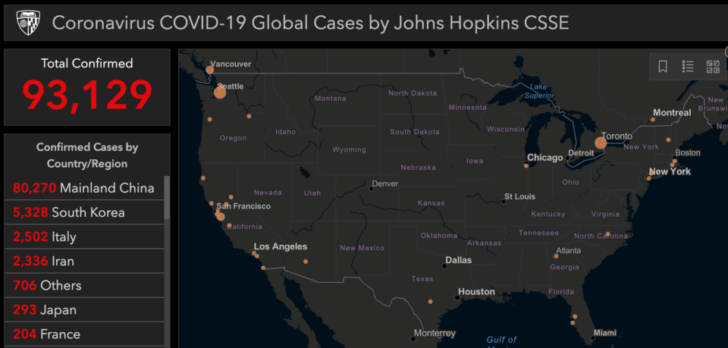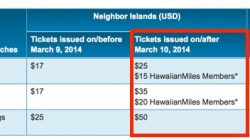Along with other segments of the economy, the travel industry is facing serious pressures in the midst of the coronavirus epidemic. All flights from the U.S. to China have been halted, Chinese carrier HNA Group is facing a state takeover, and Hong Kong-based carrier Cathay Pacific has grounded 75% of its fleet. Travel to other international destinations is also suffering, and even domestic travel is starting to take a hit as conferences are cancelled and large corporations take precautions.
More and more airlines are making it easier to adjust your travel plans in response with more flexible change and cancellation policies. This is important because most travel insurance will not cover you unless you’ve paid for an expensive “cancel for any reason” policy. In this post I’ve attempted to summarize the updated change rules for domestic U.S. carriers.

However, some of these airlines have their own self-interest in mind. Many rules only apply to tickets booked during a certain period, not for travel during a certain period, and certainly not for existing tickets. That suggests to me that some airlines’ real goal is to stem the drought in new bookings. I hope we will see a looser application of the rules as airlines face more pressure from customers.
Please feel free to leave a comment if you are aware of recent updates to these policies. Be sure to click on the links provided to learn more about other restrictions; in most cases you can book a new ticket for travel up to 12 months from the original date of purchase and you must pay the difference in fare if your new ticket is more expensive.
Alaska Airlines
Tickets booked between February 27 and March 12 for travel through February 28, 2021 (essentially the end of schedule) may be cancelled with the full value deposited in your My Wallet account. In addition, most tickets — excluding Saver Fares — are eligible for a one-time change without a fee in the form of a credit voucher, although I don’t see much difference between this and depositing the funds into My Wallet. I always prefer to use My Wallet.
Update: This waiver has now been extended to cover previously purchased tickets booked on or before February 26. However, those tickets are only eligible for a wavier if your travel will take place on or before March 31.
American Airlines
Tickets booked between March 1 and March 16 for travel through January 26, 2021, can be changed with at least 14 days notice before your initial outbound flight. This additional 14-day requirement seems quite strict since new cases could appear and multiply quickly within that window.
Update: As of March 5, American has waived the 14-day requirement and will waive fees for tickets booked between March 5 and March 31. However, tickets booked between March 1-4 will still be subject to the original rules.
Update: As of March 10, American has extended its waiver to include tickets booked before on or before March 1. However, the new travel must occur on or before December 31, 2020, or one year from the original date of issue, whichever is earlier. In addition, new tickets booked between March 1 and March 31 are also eligible for a waiver.
Delta Air Lines
Delta will waive change fees for travel to international destinations only. As of March 4, Delta updated its policy to waive change fees for all tickets, including domestic and international travel, booked between March 1 and March 31 for travel through February 25, 2021.
Update: As of March 9, Delta has revised their policy again. Now existing tickets purchased before March 9, both international and domestic, are eligible for a waiver if travel is scheduled to occur by April 30. Any new tickets purchased between March 1-31 for future travel (including beyond April) remain eligible, as well.
Frontier Airlines
Frontier will waive change or cancellation fees for travel booked between March 3 and March 16. New travel must be completed by June 1, 2020.
Update: Frontier has extended their policy to cover all tickets purchased before March 10 for travel between March 10 and April 30, as well as tickets issued March 30 through March 31. The new flight must take place by November 9, 2020.
JetBlue Airways
JetBlue will waive the change or cancellation fees for tickets booked between February 27 and March 11 for travel through June 1. The original ticket value will be issued as a TravelBank credit much like the MyWallet used by Alaska Airlines and can be used up to 1 year from the date of issuance.
Update: JetBlue has modified its waiver to include new tickets booked between March 6 and March 31 for travel through September 8, 2020. The original waiver for travel booked February 27 through march 11 still applies.
Update: For customers with existing tickets for travel between March 10 and April 30, JetBlue will waive change fees as long as the new travel takes place by October 24, 2020.
Hawaiian Airlines
Hawaiian will waive the change fee for tickets booked between March 1 and March 16. However, you must call to request the change at least 24 hours before your scheduled flight.
Update: Hawaiian has extended their waiver for new tickets to include bookings made between March 1 and March 31. In addition, they are waiving change fees on existing tickets booked before March 9 for travel between March March 9 and April 30. New travel must begin no later than December 31, 2020.
Southwest Airlines
Southwest Airlines already does not charge a change fee, and any cancelled tickets can have the full value saved and put towards a future flight (much like Alaska’s My Wallet). There are no changes to this policy under the current situation. And while Southwest does require customers to pay the difference in fare, so do all the other temporary policies being implemented by other carriers.
United Airlines
United will waive change fees for tickets to any destination when booked between March 3 and March 31. The customer must pay the difference in fare, if any. Cancelled tickets can still be used for their full value at a future date within 12 months. This was once the most generous policy among the Big Three carriers with large international networks, but now Delta has expanded their waiver to include previously booked tickets, too.
Update: United has extended their waiver to include travel previously booked on or before March 2 with travel between March 9 and April 30.
Personal Thoughts
The majority of people will not be infected by this novel coronavirus. (Even in China, fewer than 100,000 total cases have been reported out of a population of over 1 billion.) The majority of infected people will not die. But the lack of personal risk to you does not mean there is no risk to others. There is still a serious risk to some people, especially the elderly or sick. There is also the great uncertainty: we know it will end eventually, but we don’t know how long it will take or how bad it will get in the meantime.
Travel has enabled this infection to spread much more rapidly than it would otherwise, and you could infect someone else and pass along the disease without suffering much personal harm. You infect two others, who each infect two more, and so on. Each new infection could indirectly cause hundreds of future infections. So while I still have some important travel coming up, I suggest you consider whether it’s a trip you need to take and not a frivolous mileage run. Be sure to check out Steve’s tips on avoiding infection. I support others who want to play it safe and postpone trips or cancel existing travel.
Update: My own travel plans were cancelled after the other party pulled out. There you go! Probably didn’t make sense to fly anyway, but I am still looking at the possibility of booking a vacation for this summer as long as I preserve the ability to change/cancel later if the risk of contagion is still high.





